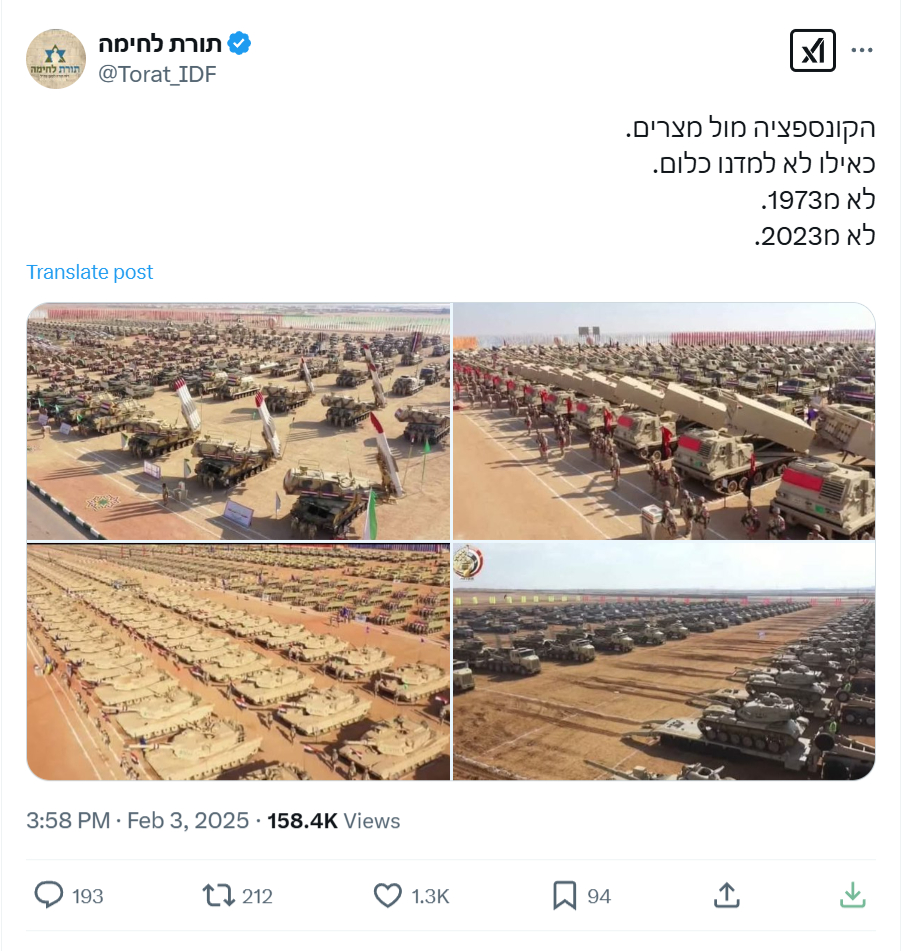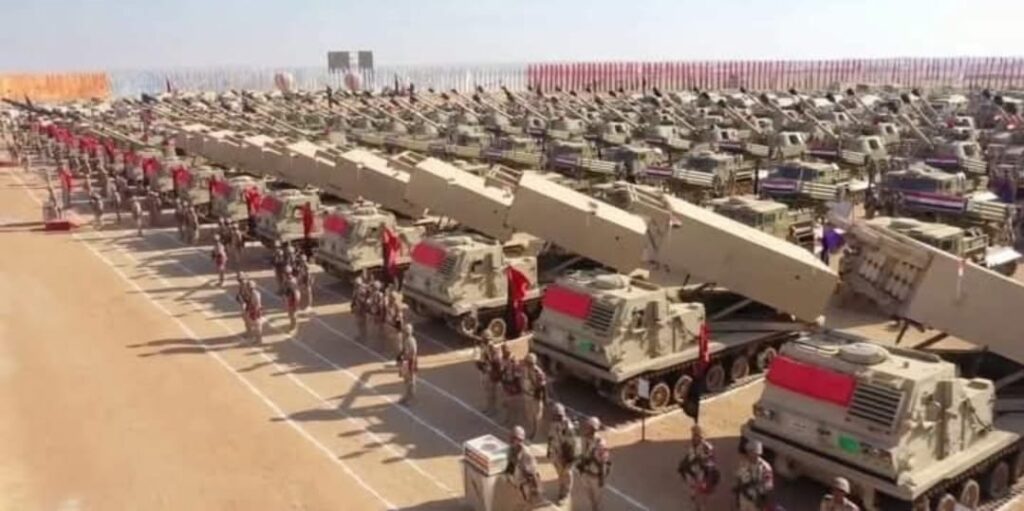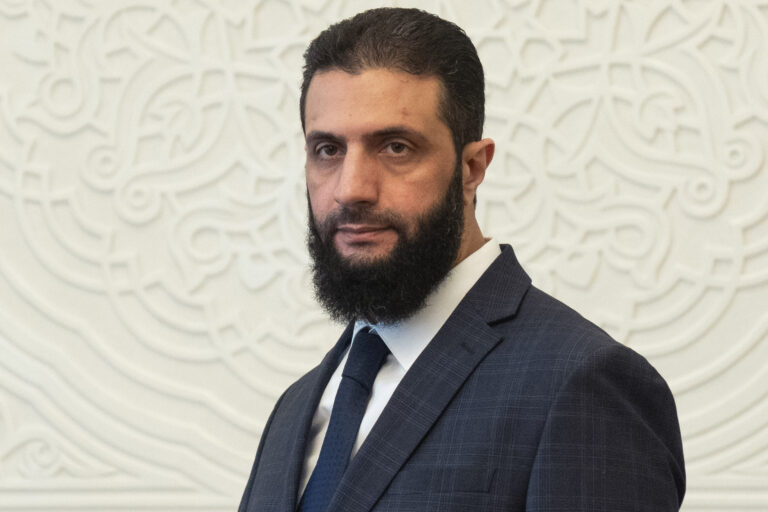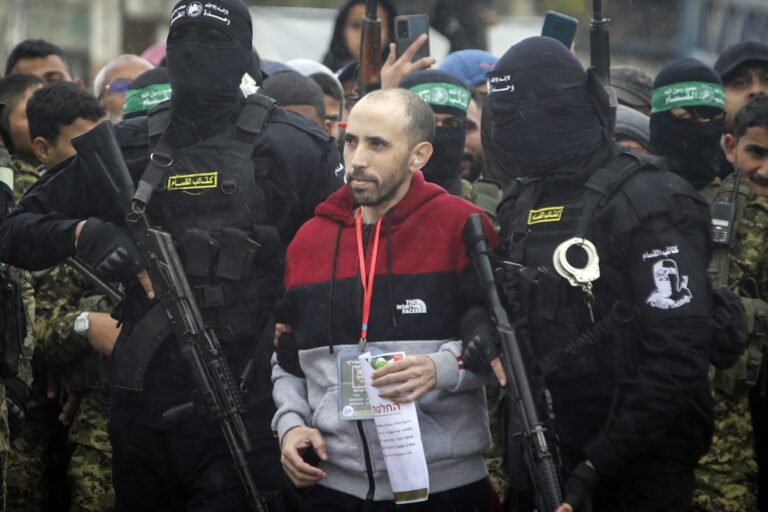There have been many disturbing developments related to Egypt in recent months and weeks, particularly a significant buildup of military forces in the Sinai that violates the terms of the Israeli-Egyptian peace deal.
A high-level Israeli military delegation reportedly visited Cairo on Friday to discuss security arrangements regarding the Philadelphi Corridor. Al-Araby Al-Jadeed reported that the Israeli delegation raised questions regarding the military build-up in the Sinai. The Egyptian military officials reportedly responded that “any violation of the agreement by the Israeli side will be met with violations by Egypt.”
According to Kan News, this was a reference to the IDF forces in the Philadelphi Corridor. The report says that Egyptian sources revealed that Cairo “conveyed an explicit warning to Israel in the military coordination meetings that the continued presence of IDF forces in the Philadelphi Corridor [on Gaza’s border with Egypt] will be considered a violation of the Camp David [Peace] Agreement between Israel and Egypt, and that Egypt would not be obligated to the agreement in the ongoing coordination regarding the situation of its forces on the border.”
The same report mentioned “Cairo’s refusal to create a new geographic reality,” a reference to Egypt’s opposition to US President Donald Trump’s plan to deport the Palestinians from Gaza.

Former Shin Bet intelligence officer Moshe Fuzaylov told JNS that, in the past, Israel allowed Egypt to increase forces in Sinai when they were battling ISIS. However, today they have a massive military presence in the Sinai, way beyond what they need to fight terror, including three airfields, one for fighter jets, along with huge reserves of gas and diesel. He said that Egypt also built large storage tunnels and transportation routes to allow large numbers of forces to arrive in Sinai within hours.
Yisrael Hayom quoted former Deputy Ambassador to Egypt and researcher at the Misgav Institute, Ruth Wasserman Lande, who is also concerned about the developments in Egypt. “Over a year ago, on October 8, Egyptian President Abdel Fattah el-Sisi made unusually harsh statements, saying that if Israel approached southern Gaza, it would be grounds for war,” she said. “I said back then that this does not bode well. This is very serious, and I wouldn’t dismiss it lightly. Over time, it has become evident that there is a significant increase in Egyptian military presence in the Sinai Peninsula, far beyond even the previous violations of the peace treaty that we had reluctantly accepted.”
“Not only are we allowing the buildup of forces on the other side, but we are also permitting it without receiving anything in return, in a way that does not align with the diplomatic language of the Middle East,” she warned.
Wasserman Lande added that Egypt views Trump’s plan to deport Palestinians from Gaza as a cause for war. “This was also what initially worried the Egyptians at the start of the war. They view this as a potential cause for war. They understand that Hamas embeds itself within the civilian population, and they do not want that scenario spilling over into Egypt. They reacted strongly when Israel was about to enter Rafah. While they ultimately did not launch a war, they have begun acting as though they are preparing for one.”
Wasserman Lande warned that a potential conflict is not a far-fetched scenario, explaining that a war requires both capability and willingness: “Egypt has the capability, the roads, bridges, tunnels, and fuel. Their reference scenario is Israel. The question is about their willingness. It may seem irrational because they know that Israel is militarily superior, especially now with strong US support. However, there is a difference between willingness and motivation. Motivation can override rational considerations. This is where we often misread our adversaries, just as we underestimated Hamas’ readiness to act. There are things more important to them than life itself, what we see as logical, they see as national honor.”
She concluded, “I believe there are those monitoring this situation closely, but given the multiple fronts, the pressure on the system, and Israel’s internal challenges, not enough attention is being paid to this possibility.”
The report also quoted former Israeli intelligence officer Lt. Col. (ret.) Eli Dekel, who has monitored Egypt’s adherence to the peace agreement since it was signed, continuing until today. “The presence of tanks near Israel’s border is a blatant violation of the peace agreement, which stipulates that most of Sinai should remain demilitarized,” he said. “There is indisputable satellite evidence showing 100 tanks in El-Arish even before the war. These tanks are entirely prohibited in the area. Violations have been ongoing for decades. Initially, there were supposed to be 22,000 soldiers in the western part of Sinai, but now the agreement has been completely eroded, with four times that number permanently stationed there.”
“Sinai is supposed to be free of all military forces. If the latest images are verified, the concern isn’t just about forces in Sinai, the key issue is the type of tanks. The images show Abrams tanks, which are Egypt’s premier battle tanks, reserved for elite units. The peace treaty allows for division-level tanks, so the question arises: What are these special forces doing in Sinai? In recent years, three new airfields have been built in Sinai, and massive tunnels have been dug, blatantly violating the peace treaty. The treaty allows for military camps for 47 battalions, currently, there are camps for 180 battalions, four times the permitted amount. These are ongoing processes.”
Dekel added that the peace agreement allows only one Egyptian military division in Sinai, with a limited number of soldiers and military equipment. He believes that the buildup is an ominous sign that Egypt may be preparing for a future assault on Israel.
Two weeks ago, Israeli envoy to the U.N. Danny Danon also expressed concerns, saying: “They spend hundreds of millions of dollars on modern military equipment every year but have no threats on their borders. Why do they need all these submarines and tanks? In the wake of October 7, this should raise alarm bells.”
(YWN Israel Desk – Jerusalem)












3 Responses
obviously they intend to invade israel. the israeli government and IDF will do nothing until it’s too late. my advice to female observers on the border in the army – desert and save yourselves!
It appears suspicious enough to consider that Egypt was aware of the Shemini Atseres attacks, and considered coming in on the side of Gaza. If their presence prevents the smuggling of arms into Gaza via the Sinai, why aren’t we hearing that? Has this been discussed in the Presidential meetings or calls with either Bibi or Sisi?
A “peace partner” would work hand in hand with their partner when dynamics change on the ground, when their partner is threatened by terrorists invading it’s territory.
Egypt is not a true peace partner. It’s more like a long term ceasefire. This buildup seems very concerning. Not sure why Israel doesn’t stop it, and why it’s been overlooked for years.